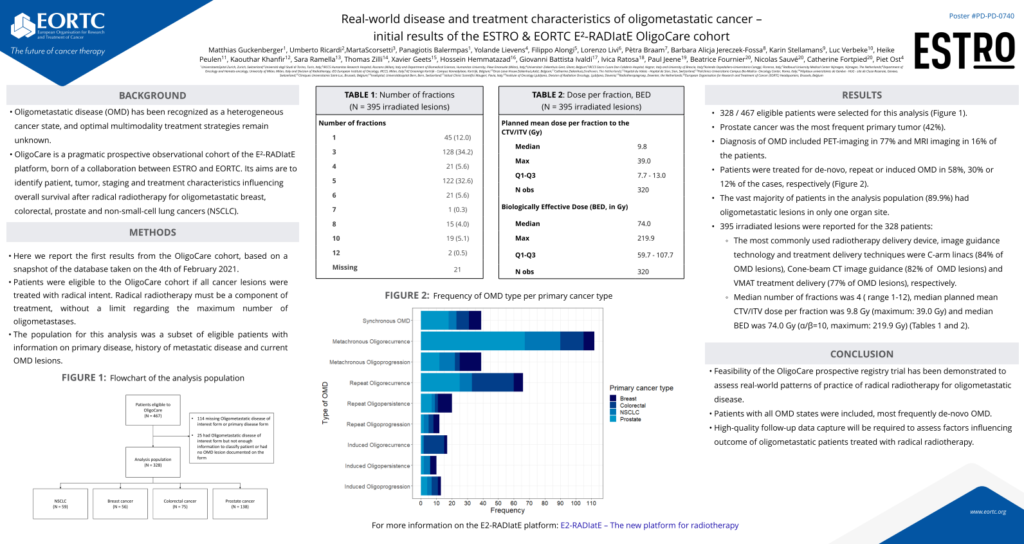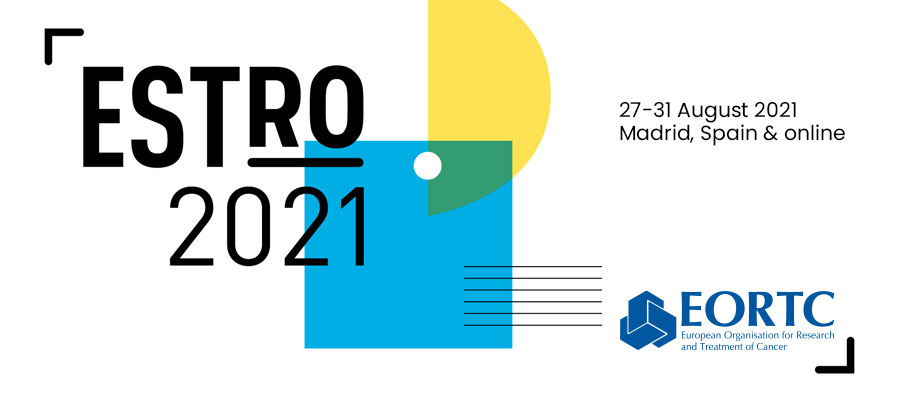News from the ESTRO 2021 congress: EORTC-ESTRO RADiation Infrastructure for Europe (E2-RADIatE) OligoCare trial assesses real-world patterns of practice of radical radiotherapy for oligometastatic disease
28 Aug 2021
Oligometastatic disease (OMD) is an intermediate state where a primary cancer has metastasised to a limited number of regions. However, it is not a homogenous cancer state, and this makes the determination of optimal treatment strategies difficult. Classification and characterisation of the different states of OMD has also been far from standardised. But in December 2019, a team of international experts from the EORTC and ESTRO published the first comprehensive system for the classification of OMD.
The OligoCare trial, an observational prospective cohort study of the E2-RADIatE collaboration between EORTC and ESTRO, aims to identify the patient, tumour, staging and treatment characteristics that influence overall survival (OS) after radical radiotherapy for oligometastatic breast, colorectal, prostate, and non-small-cell lung cancer (NSCLC) disease. The study presented at ESTRO 2021 used real word data to further assess this classification system and its prognostic value.
Presenting preliminary results, Professor Dr Matthias Guckenberger, Chairman of the Department of Radiation Oncology, University Hospital of Zurich, Zurich, Switzerland, said that between July 2019 and February 2021, a total of 19 institutions enrolled 467 patients into the OligoCare cohort. Results presented involved 328 of those patients, and information on their primary disease, history of metastatic disease and their current OMD status formed the basis of the analysis. Prostate cancer was the most frequent primary tumour (42%) followed by colorectal cancer (23%), NSCLC (18%) and breast cancer (17%). Diagnosis of OMD included PET-imaging in 77% and MRI imaging in 16% of the patients.
“The outcome of this preliminary analysis shows the strong support of the radiation oncology community to collect high-quality prospective data, aiming to assess real-world patterns of the practice of radical radiotherapy in OMD”, says Professor Dr Piet Ost, the project’s co-principal investigator.

Related News
Meet the new EORTC Board
9 Jul 2024
We are pleased to announce the release of the EORTC 2023 Annual Report
17 Jun 2024
Dr Denis Lacombe, EORTC CEO, appointed stakeholder co-chair of ACT EU advisory group
24 May 2024
Clinical Trials Day 2024: a Q&A on pragmatic clinical trials
20 May 2024
EORTC/EMA workshop suggests an international way forward for treatment optimisation studies
8 May 2024
EORTC’s Participation at the ESTRO Congress 2024
29 Apr 2024
EORTC: Advancing research and treatment for rare cancers
29 Feb 2024
EORTC Fellowship Programme: celebrating more than 20 years of impactful collaboration
22 Feb 2024
Appointment of Malte Peters as EORTC Strategic Alliance Officer
9 Feb 2024
Unique series of workshops in partnership with the European Medicines Agency (EMA)
7 Feb 2024


